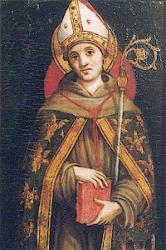1693 - 1773 Person Name: Johann Ludwig Conrad Allendorf Hymnal Number: 494 Author of "Die Seele ruht in Jesus Armen" in Deutsches Gesangbuch Allendorf, Johann Ludwig Konrad, b. Feb. 9, 1693, at Josbach, near Marburg, Hesse, where his father was pastor. He entered the University of Giessen in 1711, but in 1713 passed on to Halle to study under Francke, and then, in 1717, became tutor in the family of Count Henkel of Odersberg. In 1723 he became tutor to the family of Count Erdmann v. Promnitz at Sorau, and in 1724 was appointed Lutheran Court preacher at Cothen, when one of the Count's daughters was married to the Prince of Anhalt-Cothen. After the death of his first wife the Prince married her younger sister, but the latter, dying in 1750, the need for a Lutheran Court preacher ceased, he being of the Reformed Confession. Allendorf was then summoned by Count Christian Ernst v. Stolberg to Wernigerode, where a sister of his former patronesses was the wife of the Count's eldest son. There he was assistant in two churches till 1755, when he was appointed pastor of the Liebfrau Church, and a member of the Consistory. In 1760 he became pastor of St. Ulrich's Church in Halle, and successfully laboured there till, on June 3,1773, "As a Simeon of eighty years he received his peaceful summons home to rest in the arms of Jesus" (Koch, iv. 441-446; Allgemeine Deutsche Biographie., i. 349, &c). His hymns, which are "hymns of love to Christ, the Lamb of God, and the Bridegroom of the believing soul," appeared principally in the Einige gantz neue auserlesene Lieder, Halle, N.D. (c. 1733), and the Einige gantz neue Lieder zum Lobe des Dreijeinigen Gottes und zur gewunschteh reichen Erbauung vieler Menschen. The latter, known as the Cothnische Lieder, contains hymns of the Pietists of the younger Halle School, such as Lehr, Allendorf, Woltersdorf, Kunth, &c.; and to its first ed., 1736, Allendorf contributed 45 hymns, while the 4th edition, 1744, contains in its second pt. 46, and the 5th ed., 1768, in its third pt. 41 additional hymns by him-—in all 132. Four of his hymns have been translated, viz.:—
1. Das Brunnlein quillt,das Lebenswasser fiiesset. [Holy Communion] Founded on Ps. lxv. first published in 1733, p. 14, and included, in 1736, as above, in 9 stanzas of 8 lines, as a "Brunnenlied." Repeated as No. 1570 in the Berlin G. L. S. ed. 1863. The only translation in common use is:—
The Fountain flows!—its waters—all are needing, omitting st. iv., vi., ix., by H. Mills in his Horac Germanicae, 1845 (ed. 1856, p. 43). The tr. of st. i.-iii., viii., altered to " The Fountain flows! waters of life bestowing," were included, as No. 819, in the Lutheran General Synod's Colletion 1850.
2. Die Seele ruht in Jesu Armen. [Eternal Life.] Founded on an anonymous hymn in 5 stanzas beginning, "Ich ruhe nun in Gottes Armen," included as No. 655, in pt. ii., 1714, of Freylinghausen's Gesang-Buch; but not in the Einhundert . . . Lieder, Dresden, 1694 [Leipzig Town Library]. According to Lauxmann in Koch, viii. 689, Allendorf's hymn was first printed separately. In pt. ii. of the 4th ed., 1744, of the Cothnische Lieder, as above, p. 264, in 13 st. of 101. entitled, "Of a soul blessed there with the beatific vision," Rev. xxii. 4. Written in the spirit of Canticles, it is included in full in the Neue Sammlung, Wernigerode, 1752, No. 92, but is generally abridged, Knapp, in his Evangelischer LiederSchatz., 1850, No. 3059.(ed. 1865, No. 3123) altering it and omitting stanzas vi., ix., x. Lauxmann relates that Diaconus Schlipalius, of the Holy Cross Church in Dresden, told his wife on Jan. 1,1764, while he was yet in perfect health, that he would die during the year. He comforted her apprehensions with stanzas vi.-xi. of this hymn, which consoled himself shortly before his death on April 6 of that year. The only translation in common use is:-
Now rests her soul in Jesus' arms. A good translation of stanzas i., ii., viii., xii., xiii., in the 1st Ser., 1855, of Miss Winkworth's Lyra Germanica, p. 250 (later eds. p. 252). Thence, omitting st. xii., as No. 362 in E. H. Bickersteth's Psalms & Hymns, 1858. Another translation is, "In Jesus' arms her soul doth rest," by Mrs. Bevan, 1858, p. 42.
3. Jesus ist kommen, Grand ewiger Freude.[Advent] First pub. in 1736 as above (ed. 1738, p. 102), in 23 st. of 6 1., as a hymn of triumph on the Coming of the Saviour to our world, St. John iii. 31. In the Speier Gesang-Buch, 1859, 11 st. are selected, and in the Wurttemberg Gesang-Buch., 1842, 6 st. are given as No. 84. The only translation is, "Jesus is come, O joy heaven-lighted,” by Miss Warner, in her Hymns of the Church Militant, 1858 (ed. 1861, p. 433).
4. Unter Lilien jener Freuden. [Longing for Heaven.] A beautiful hymn on the Joys of Heaven, more suited for private than for Church use. It appeared as, "In den Auen jener Freuden," in the Sammlung Geist-und licblicher Lieder, Herrnhut, 1731, No. 1004, in 8 stanzas of 6 1ines. When repeated in 1733, p. 67, and in 1736, in the Cothnische Lieder, as above, Ps. lxxxiv. 3, was given as a motto, and the first line as Unter Lilien. Included in this form as No. 721 in the Berlin Geistliche Lieder ed. 1863. Lauxmann, in Koch, viii. 687-689, relates that it was repeated on her death-bed by the first wife of Jung-Stilling, and that it was a favourite hymn of Wilhelm Hofacker, a well-known Wurttemberg clergyman. The only translation is, "Glorious are the fields of heaven," by Mrs. Bevan, 1859, p. 131.
-- John Julian, Dictionary of Hymnology (1907)
J. L. K. Allendorf


 My Starred Hymns
My Starred Hymns



